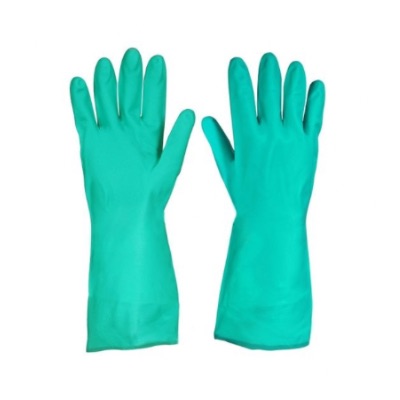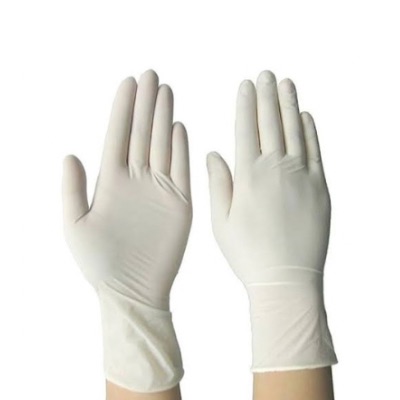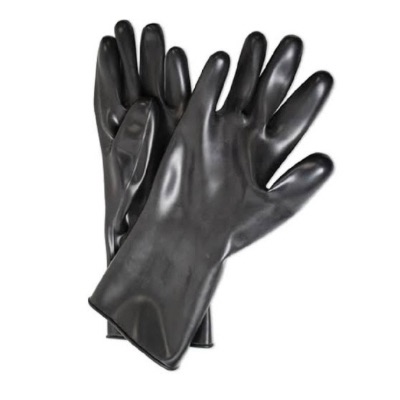Hazardous gloves made of different materials can resist a variety of chemical substances. But how do you know what type of gloves can protect your hands from hazardous chemicals,In this article, you’ll learn about hazardous chemical gloves, their types and their pros and cons, factors to consider before buying, and a comparison chart to help you make your decision.
Meaning Of Hazardous Chemical Gloves
Hazardous chemical gloves are gloves that do not come into contact with any type of hazardous chemicals, which means they are highly resistant to chemicals such as ketones, alcohols, acids, solvents, inks, and ethidium bromide.
Classification of anti-hazardous chemicals gloves
Nitrile gloves

You must have heard of nitrile gloves, right? They are also called nitrile rubber (Buna-N) or nitrile butadiene rubber (NBR). They are disposable hazardous chemical gloves made of synthetic rubber copolymer. It is resistant to chemicals such as solvents, chemicals, oils and acids as they are the most resistant to these chemicals.
At the same time, chemical resistance often depends on the material. Nitrile gloves that contain more acrylonitrile material will have a higher level of resistance to oil swelling, while nitrile gloves that contain less acrylonitrile material will only give you more Great flexibility.
Features of nitrile gloves:
- It does not contain natural rubber latex, which means if you are allergic to latex, you will love how it works.
- No matter how harsh the chemicals you are exposed to, they can help you more than you expect because they have high levels of oil and acid resistance.
- Punctures and abrasions cannot penetrate them as quickly because they are made of durable materials.
- Thanks to their thinness and flexibility, you can guarantee maximum flexibility and comfort.
- The challenges of grip and tactile sensitivity are entirely up in the air because they come from textured surfaces.
- You can even choose according to your preferred size and thickness.
Disadvantages of nitrile gloves:
- They are more expensive.
- Unlike latex gloves, nitrile gloves do not have the ability to stretch well.
- Nitrile gloves are not capable of delivering their full performance in high temperature applications.
- Their synthetic materials set them apart from eco-friendly gloves.
- You can’t use them for long periods of time because certain chemicals like acetone can degrade them quickly.
- Sometimes, contamination occurs due to improper disposal.
Application of nitrile gloves
- Chemical handling industry: Used to prevent chemical exposure.
- Laboratory:For protection against skin irritation and pollution.
- Beauty salon:Ensure proper hygiene and food safety.
- Healthcare: For protection of body fluids, bloodborne pathogens and other chemotherapy drugs.
- Industry and Manufacturing: Used to resist chemicals, oils and acids.
Neoprene gloves

Neoprene is a good detoxifier of hazardous chemicals, providing maximum protection from a wide range of chemicals including oils, acids, solvents and corrosives. Neoprene is a product of synthetic or artificial rubber. Sometimes, it can even be made from polychloroprene (CPR) or neoprene for flexibility, thickness, and other protective features.
Additionally, neoprene is no more resistant to snags, punctures, abrasions, and cuts than nitrile or natural rubber. But when it comes to durability and popularity, it is one of the best personal protective equipment (PPE) and is ideal for cleaning and maintenance industries, chemical handling, and industrial and mechanical work.
Advantages of Neoprene Gloves
- Provides you with protection from a wide range of chemicals.
- Heat resistant and protects you from thermal hazards.
- Thanks to its water-resistant layer, it’s suitable for wet environments and gives you mobility in cold temperatures.
- Longer service life due to its abrasion and puncture resistance.
- Features textured handles for a secure grip in slippery conditions.
- Reduces skin irritation, especially if you are allergic to latex.
- Ideal for harsh conditions due to its strong and high puncture resistance.
Disadvantages of Neoprene Gloves
- They are not suitable for high temperatures.
- The material degrades over time when you expose it to certain chemicals.
- You may feel fatigued due to their weight.
- Their synthetic rubber makes them less environmentally friendly.
- Sweating and discomfort may occur when used for extended periods of time.
Application areas Neoprene gloves:
- Chemical transportation and handling: Prevent chemical exposure, leaks and spills.
- Printing industry:Resistant to solvents and chemicals such as toluene, methanol and ethyl acetate.
- Industrial chemical processing:Keep workers protected from hazardous materials, corrosive substances and chemicals.
- Refining and petrochemicals:Pause on chemicals, abrasion and cutting.
Fluorine rubber gloves
Viton gloves are known for their ability to withstand hazardous chemicals such as aromatic solvents, acids, alcohols, PCBs and trichlorethylene. They are products of fluorocarbon material, which is a type of synthetic rubber material. The purpose of this material is to provide you with protection from a variety of chemicals, such as chlorinated and aromatic solvents, PCBs, and vapors.
Different materials, such as unlined Viton and butyl, can also be combined to create Viton gloves, which is another reason why they can easily grip and resist aromatics like benzene, toluene, and xylene. The reason why Viton gloves are widely used in the chemical industry, mainly when handling chlorinated and aromatic solvents, is due to their highly corrosive chemical resistance properties.
Advantages of fluorine rubber gloves
- It has extraordinary resistance to chemicals such as strong acids and alkalis, corrosive chemicals, fuels and ozone aging.
- Featuring a double-layer construction for optimal chemical resistance and protection.
- Soft and flexible, it provides excellent protection and maintenance.
- This is a good choice when you are dealing with hazardous industrial waste and applications that are highly resistant to chemicals.
- Features a smooth surface for easy maintenance.
- Some models of Viton gloves provide radiation attenuation up to 0.01 lead equivalent.
- They are highly resistant to opioids and stomach acid.
Disadvantages of fluorine rubber gloves
- They cost more compared to other hazardous chemical gloves.
- They are not as usable as other gloves.
- Due to their stiff material, fluoroelastomer gloves can cause discomfort and have limited flexibility.
- Viton gloves have limited tear and puncture resistance compared to nitrile or butyl rubber gloves.
- You cannot use them universally because they are only resistant to specific hazardous environments.
- You will definitely experience fatigue when you use them for too long.
Application of fluorine rubber gloves
- Pharmaceutical and industrial applications:They effectively protect against the effects of chemicals in industrial environments.
- Aerospace and automotive industries:They are resistant to fuel, petroleum and other chemicals used in the automotive and aerospace industries.
- Outdoor use:Due to their resistance to oxygen and ozone, they are suitable for pipes, hoses, seals and gaskets.
Latex gloves

Latex gloves are an excellent choice when you are handling biological materials such as bacteria, fungi, viruses, urine, blood, serum, and microorganisms, or chemicals such as weak acids, weak bases, dilute bases, amines, and detergents. These types of gloves are a product of natural rubber latex.
Additionally, latex gloves are medical gloves as they minimize the rate at which contamination and infection spread, which is all the more reasons why they are most recommended for use in healthcare settings such as medical offices, hospitals, and clinics.
Advantages of latex gloves:
- Latex gloves are flexible and widely used in surgery and healthcare.
- It completely stops the spread of pathogens and minimizes the risk of infection by forming a barrier to body fluids such as feces, blood and urine.
- They are inexpensive compared to other chemical hazard gloves such as nitrile or vinyl.
- Latex gloves have been around for decades, which means it’s well-established in the medical industry.
Disadvantages of latex gloves
- If you are allergic to it, you can develop rashes, asthma, shock, and respiratory irritation.
- You may develop dermatitis due to the powder added to latex gloves.
- They don’t offer you enough protection because they are only resistant to certain dangerous chemicals.
- Their protective properties may be compromised because they are less durable.
- They are permeable, which means substances can penetrate them.
- Latex gloves may break down if they come into contact with certain chemicals.
Applications of latex gloves:
- Manufacturing company:They help you resist isocyanates and solvents in manufacturing environments.
- Food Service and Processing:They are important to prevent contamination when handling ready-to-eat foods.
- Medical and dental:They are important to protect you from body fluids, viruses, and bacteria when you are administering first aid to a patient or performing surgery.
- Automotive industry:You can use latex gloves to protect your hands from chemicals, oils, and other substances when repairing or maintaining your vehicle.
- Laboratory setup:Latex gloves are very important when handling biological samples and other chemicals in the laboratory.
Butyl rubber gloves
Butyl rubber gloves provide excellent protection against hazardous chemicals such as chlorine, nitric acid and ammonia in Toxic Industrial Chemicals (TICs) and asbestos, pesticides and cyanide in Toxic Industrial Materials (TIMs).
They are a product of synthetic material, specifically called butyl rubber. Butyl rubber is added to these gloves to ensure gas and liquid impermeability, good flexibility and high durability.
Advantages of butyl rubber gloves:
- High resistance to ketones, corrosive acids and esters.
- Good flexibility and grip even at low temperatures.
- Meets Department of Defense standards.
- Butyl rubber gloves have a strong background in medical and industrial settings.
- Smooth and textured finish.
- Available in a variety of styles and in a variety of thicknesses from 7 mils to 35 mils.
- Flexible in hot and cold temperatures.
- Excellent air tightness, the best choice for protecting gas leaks.
- High durability and resistance to degradation.
Disadvantages of Butyl Rubber Gloves
- Not widely used yet.
- Heavier compared to other types of hazardous chemical gloves.
- It is not resistant to grease, gasoline and hydrocarbon oils.
- Due to its thickness, tactile sensitivity is limited.
- Due to its limited availability, it is expensive.
Applications of Butyl Rubber Gloves
- Military and Homeland Security: They are used in chemical warfare and biological agent handling in military homeland applications.
- Automotive and Aerospace:They are necessary when exposed to chemicals and other substances during maintenance procedures and manufacturing processes.
- Industry and Manufacturing:They are important for protecting your hands from chemicals when degreasing, handling chemicals, and coming into contact with other solvents.
- Chemical handling and processing:Ideal for you when you handle benzene, toluene, xylene, esters, ketones and strong acids in the chemical handling and processing industries.
- Agricultural and veterinary applications: They are used to treat insecticides, insecticides, formalin, glutaraldehyde and ethylene oxide to prevent skin damage.
Polyvinyl alcohol (PVA) gloves

Polyethylene gloves are another name for PVA gloves. They are compatible when you want to handle strong organic solvents such as methanol, hexane, chloroform, acetone and xylene. Additionally, they are great when you are dealing with temperature and other cutting applications.
Materials such as polyvinyl alcohol are used to resist chlorinated, aromatic and aliphatic solvents that can degrade neoprene, nitrile, latex and rubber. However, you cannot use PVA gloves in a water-based environment because they are water-soluble.
Features of polyvinyl alcohol (PVA) gloves:
- Perfect for handling strong organic solvents, optimal chemical resistance makes it ideal for industrial environments
- Provides minimal absorption, which is necessary to eliminate shrinkage and swelling.
- Based on a healthy balance between flexibility and protection, you can wear them for longer periods of time without any discomfort.
- Minimize the possibility of skin burns, chemical burns, or other solvent-related injuries.
- Despite its strength, it still offers flexibility.
- Highly tear-resistant even when handling heavy-duty applications.
Disadvantages of polyvinyl alcohol (PVA) gloves:
- They are not suitable for water-based solutions as they dissolve in the water environment.
- There are limits on the hazardous chemicals they can resist.
- It costs more.
- Sources are difficult to find due to limited supply.
- Little or no resistance to extreme heat or flame.
Applications of polyvinyl alcohol (PVA) gloves
- Laboratories and Research:They can handle a wide range of hazardous chemicals, making them suitable for laboratory environments.
- Biomedical Engineering:It has low toxicity, making it a good choice for cartilage, orthopedic and vascular transplant research where medical applications are considered.
- Chemical processing:They are suitable for metal processing, plastics manufacturing and graphic arts as they are resistant to aromatic, aliphatic and chlorinated solvents.
- Pharmaceutical industry: They can help you combat the effects of ketones in applications such as 3D printing oral dosage forms.
- Electronics industry: The electronics industry may also require polyvinyl alcohol (PVA) glove services to clean or degrease electronic components.
PVC gloves
PVC (polyvinyl chloride) gloves are a product of synthetic rubber, usually polyvinyl chloride (PVC). The reason they exist is to resist chemicals such as weak acids, alkalis, petroleum products, and fats.
Features and benefits of PVC (polyvinyl chloride) gloves:
- They are perfectly resistant to hazardous chemicals such as acids, alkalis, oils and solvents.
- They are lightweight and flexible, making them easy to move around.
- Thanks to their soft lining and ergonomic design, they reduce fatigue on your hands.
- Their excellent durability makes them highly resistant to physical wear and tear.
Disadvantages of PVC gloves:
- They are less suitable when you are dealing with ketones, aromatic hydrocarbons and strong solvents.
- They are not puncture resistant.
- They are less flexible than nitrile or latex gloves, which means they have limited flexibility for performing precise tasks.
- PVC (polyvinyl chloride) gloves may become brittle or crack if they are used in extremely cold or hot temperatures.
- You can easily sweat, which can cause discomfort because air can’t penetrate.
- If you are sensitive to PVC (polyvinyl chloride) glove additives, it may cause skin irritation.
Applications of PVC gloves
- Agriculture:They’re great for handling fertilizers and pesticides, helping you reduce skin exposure and chances of contamination.
- Maintenance and repair industry:Since they reduce the barrier of oil or grease substances, you can use them for maintenance and repairs.
- Food handling:Since they are latex-free, you can use them in the food industry for packaging and food processing.
- Chemical handling: Chemical manufacturing companies, laboratories and pharmaceutical companies can use them because they are resistant to alkalis, chemicals and acids.
Factors to consider before choosing the type of hazardous chemical gloves for your job
- chemical resistance: Choose gloves that are resistant to the actual hazardous chemicals you will be handling.
- penetration: If you want, consider having a penetration test done for you to determine the glove’s breakout time.
- Degradation:No matter which glove you want to choose, make sure it’s resistant to hazardous chemicals.
- allergic reaction:Depending on your choice of use, choosing a glove that can withstand chemicals as well as cuts, scrapes, and snags is a good decision.
- Material properties:For example, neoprene, nitrile, and nofoil offer a variety of benefits and properties, so it’s important for you to consider flexibility, texture, and thickness.
- Glove length:To prevent hazardous chemicals from coming into contact with your skin, consider purchasing hazardous chemical gloves that extend beyond the wrist.
- Fit and Comfort:Another factor to consider is gloves that provide enough dexterity and comfort for the hazardous chemicals you are handling.
- Manufacturing methods and quality control:Carry out proper inspection to ensure that the gloves you wish to purchase are produced using high-quality materials to prevent accidental and premature wear and tear.
- Specific hazards:Choose gloves based on the actual hazard you want to avoid.
- Multilayer board options:Multiple layers of gloves, such as polyvinyl alcohol (PVA) gloves orIf you handle a variety of hazardous chemicals, PVC gloves are perfect for you.
FAQ
What type of gloves can protect your hands from hazardous chemicals?
The hazardous chemicals you handle determine the type of gloves you should use. For example, nitrile gloves are suitable for use with solvents and chemicals, while neoprene is great for caustics and solvents. This means that different gloves can provide protection for different hazards.
in conclusion
In summary, familiarizing yourself with hazardous chemical gloves and the chemicals they are resistant to is a smart way to help you make your decision. However, referring to this article will help you understand the type of hazardous chemical gloves you can choose based on the hazardous chemicals you are actually handling at the time.




